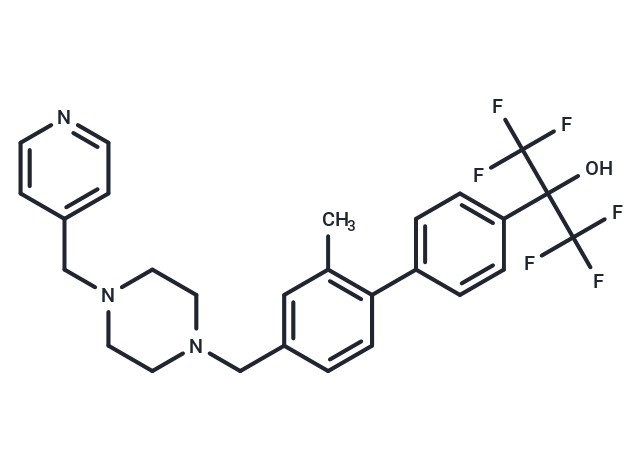- Remove All
 Your shopping cart is currently empty
Your shopping cart is currently empty
SR 1903
SR 1903 is a modulator of retinoic acid receptor-related orphan receptor γ (RORγ) and liver X receptor (LXR).1 It is an inverse agonist of RORγ (IC50 = ~100 nM in a cell-based reporter assay) and an agonist of LXR. It also binds to peroxisome proliferator-activated receptor γ (PPARγ; IC50 = 209 nM) but does not activate it. SR 1903 (10 μM) inhibits LPS-induced expression of triggering receptor expressed on myeloid cells 1 (TREM-1) in RAW 264.7 cells. It also inhibits LPS-induced expression of the LXR target genes IL-6 and IL-33 and increases expression of ABCG1, FASN, and SCD-1 in RAW 264.7 cells. SR 1903 (20 mg/kg twice per day) reduces severity score in a mouse model of collagen-induced arthritis. It reduces blood glucose levels in a glucose tolerance test, serum levels of total cholesterol and LDL, body weight, and fat mass in a mouse model of high-fat diet-induced obesity.

SR 1903
| Pack Size | Price | Availability | Quantity |
|---|---|---|---|
| 1 mg | Inquiry | 35 days | |
| 5 mg | Inquiry | 35 days | |
| 10 mg | Inquiry | 35 days |
Product Introduction
| Description | SR 1903 is a modulator of retinoic acid receptor-related orphan receptor γ (RORγ) and liver X receptor (LXR).1 It is an inverse agonist of RORγ (IC50 = ~100 nM in a cell-based reporter assay) and an agonist of LXR. It also binds to peroxisome proliferator-activated receptor γ (PPARγ; IC50 = 209 nM) but does not activate it. SR 1903 (10 μM) inhibits LPS-induced expression of triggering receptor expressed on myeloid cells 1 (TREM-1) in RAW 264.7 cells. It also inhibits LPS-induced expression of the LXR target genes IL-6 and IL-33 and increases expression of ABCG1, FASN, and SCD-1 in RAW 264.7 cells. SR 1903 (20 mg/kg twice per day) reduces severity score in a mouse model of collagen-induced arthritis. It reduces blood glucose levels in a glucose tolerance test, serum levels of total cholesterol and LDL, body weight, and fat mass in a mouse model of high-fat diet-induced obesity.References1. Chang, M.R., Ciesla, A., Strutzenberg, T.S., et al. Unique polypharmacology nuclear receptor modulator blocks inflammatory signaling pathways. ACS Chem. Biol. 14(5), 1051-1062 (2019). SR 1903 is a modulator of retinoic acid receptor-related orphan receptor γ (RORγ) and liver X receptor (LXR).1 It is an inverse agonist of RORγ (IC50 = ~100 nM in a cell-based reporter assay) and an agonist of LXR. It also binds to peroxisome proliferator-activated receptor γ (PPARγ; IC50 = 209 nM) but does not activate it. SR 1903 (10 μM) inhibits LPS-induced expression of triggering receptor expressed on myeloid cells 1 (TREM-1) in RAW 264.7 cells. It also inhibits LPS-induced expression of the LXR target genes IL-6 and IL-33 and increases expression of ABCG1, FASN, and SCD-1 in RAW 264.7 cells. SR 1903 (20 mg/kg twice per day) reduces severity score in a mouse model of collagen-induced arthritis. It reduces blood glucose levels in a glucose tolerance test, serum levels of total cholesterol and LDL, body weight, and fat mass in a mouse model of high-fat diet-induced obesity. References1. Chang, M.R., Ciesla, A., Strutzenberg, T.S., et al. Unique polypharmacology nuclear receptor modulator blocks inflammatory signaling pathways. ACS Chem. Biol. 14(5), 1051-1062 (2019). |
| Molecular Weight | 523.51 |
| Formula | C27H27F6N3O |
| Cas No. | 1414248-06-8 |
| Relative Density. | 1.307 g/cm3 (Predicted) |
| Storage | Powder: -20°C for 3 years | In solvent: -80°C for 1 year | Shipping with blue ice. | ||||||||||||||||||||||||||||||
| Solubility Information | DMSO: 20 mg/mL (38.2 mM), Sonication is recommended. DMF: 20 mg/mL (38.2 mM), Sonication is recommended. Ethanol: 10 mg/mL (19.1 mM), Sonication is recommended. | ||||||||||||||||||||||||||||||
Solution Preparation Table | |||||||||||||||||||||||||||||||
Ethanol/DMSO/DMF
DMSO/DMF
| |||||||||||||||||||||||||||||||
Calculator
In Vivo Formulation Calculator (Clear solution)
Dose Conversion
Tech Support

Copyright © 2015-2025 TargetMol Chemicals Inc. All Rights Reserved.




